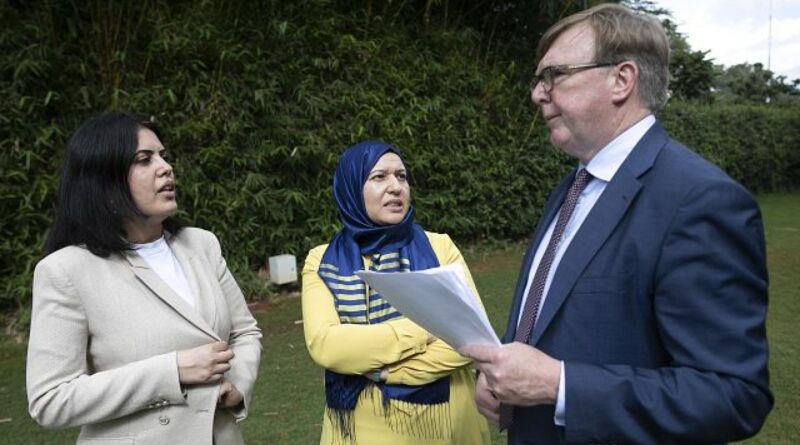Families of imprisoned Tunisian dissidents head to ICC
Yusra Ghannouchi (C) and Kaouther Ferjani (L), daughters of prominent Tunisian political detainees, with their lawyer barrister Rodney Dixon, on May 23, 2023 in Nairobi.
–
Copyright © africanews
TONY KARUMBA/AFP or licensors
Netherlands
Family members of jailed lawyers and politicians in Tunisia want the International Criminal Court to investigate claims of political persecution and human rights violations as an increasing number of President Kais Saied’s opponents are arrested and several in prison stage hunger strikes.
The investihgation is two-fold, the families’ lawyer said Thursday (Oct. 05): “Persons have been detained unlawfully, arbitrarily mistreated, in some cases tortured. They don’t know what the charges are against them. The evidence hasn’t been presented and there’s no end in sight as to how long they will remain detained,” Rodney Dixon said.
“Secondly, there has been a wave of brutal repression against Black Tunisians and migrants in Tunisia.”
Members of the same group made a similar case to the African Court on Human and Peoples’ Rights on May 24, 2023 seeking the immediate release of their loved ones.
At that time, over 20 political opponents and other personalities had been arrested in action that has been roundly condemned by the international community and rights groups. That number has increased throughout the months.
Yusra Ghannouchi, the daughter of jailed opposition leader Rached Ghannouchi, joined other jailed dissidents’ sons and daughters in The Hague to announce plans to pursue action at the court.
Responsability of the E.U
She told Euronews that she considers Europe responsible “through not condemning the coup, through giving tacit approval to what has been happening under Kais Saied. Europe is responsible for the situation we are all in now in terms of the crackdown on the opposition as well as the increase in violations against refugees.”
In a news release on Monday (Oct. 2), the group of relatives of jailed opposition figues noted the increasing number of judges, politicians, journalists and prominent opposition voices being arrested and alleged a campaign of persecution against Black migrants throughout Tunisia.
The case has been brought under Article 15 of the court’s Rome Statute, which allows the prosecutor to investigate on its “own initiative,” bypassing the need to obtain a referral from a member state or the United Nations Security Council.
The Court’s founding treaty [Editor’s note: known as the Rome Statute] grants the ICC jurisdiction over four main crimes: genocide, crimes against humanity, war crimes and the crime fo aggression.
The team’s lawyer acknowledged it would be “difficult” to ensure the ICC launches the investigation. Complaints brought through Article 15 have however been investigated by the prosecutor in the past, including against human rights violations in Myanmar.
“We’re calling on the ICC prosecutor to at least visit Tunisia in order to send a very clear signal that these serious crimes against humanity over which the court has jurisdiction should not be tolerated,” the lawyer said.
Related articles


